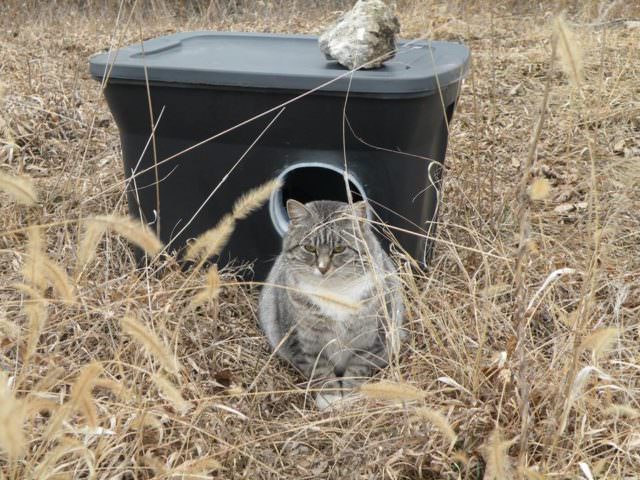Like many college campuses across the country, the University of Nebraska-Lincoln had a feral cat problem.
In 2008, a band of faculty and staff created the volunteer group, Husker Cats – named for UNL’s mascot, the Cornhusker. The project has managed to reduce the on campus feral population from over 100 cats down to less than 70 through humane Trap/Neuter/Release and foster/adoption programs.

Instead of rounding up the cats and attempting to make them someone else’s problem, UNL embraced the population by creating feeding stations and cat houses for shelter across campus.

The administration recognized that the cats offered more than just an opportunity to do some good; they offered a wonderful chance for students to learn about compassion and civic responsibility.
Staff volunteer, Rebecca Cahoon posted the following photo with the lovely caption:
This is how many cats show us they love us. They watch for us and wait for us, every day. We look for them and they look for us. No head butts, no belly rubs— just faith. That’s love too.

The original goals of the program were to stabilize the population through trap and release, place kittens into foster care and permanent homes, provide food, shelter and veterinary care to the colony cats, and reduce the feral numbers to a healthy, non-reproductive state within 5 years. All this while maintaining the beauty of the campus.
It was a very ambitious plan, but the Husker Cats volunteers made it happen. Today the kitties are as much a part of campus life as dorm rooms and cafeteria food – embraced by faculty, staff and students alike.
Many students have joined the administration’s cause by volunteering their services. Reggie Graham of Husker Cats told Love Meow:
“Students volunteer to help clean stations and feed. We work with both our local Humane Society and a no-kill shelter to neuter/spay, eartip and vaccinate the ferals we trap.”
Graham noted that the Husker Cat program is modeled after similar efforts made on the Stanford and Texas A&M campuses.

Nowadays, litters of kittens are a rare occurrence at UNL, but when they do arrive they are quickly rounded up and placed with loving foster parents until they are old enough to be adopted.

Many of the adult cats on campus have warmed up to their human caretakers and gone on to foster care and permanent homes as well. The ones that remain wild have a constant source of shelter, food and medical care to rely on.

Aside from the volunteer opportunities, the program also provides the students with a source of stress relief. They love observing and interacting with the cats around campus. Many even have their favorites and call to them by name when they see them.
Let’s hope this wonderful idea catches on and continues to spread to college campuses across the country!
Featured Image via Facebook/Nancy Becker
